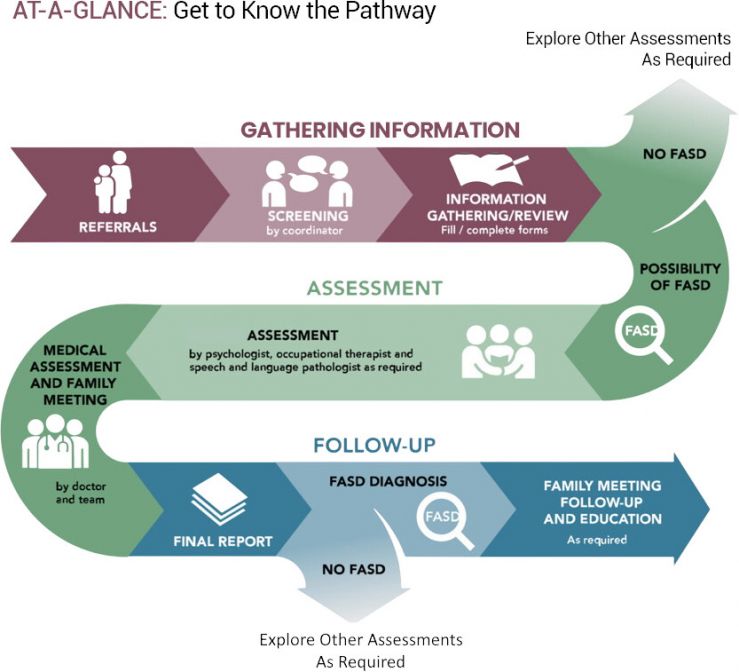We are an FASD Diagnostic Assessment Clinic for Adults (formerly FASD Okanagan Valley Assessment and Support Society) and now a program of Independent Living Vernon.
We are in the People's Place at #104, 3402 27 Avenue, Vernon B.C. V1T 1S1
Phone Number: 250-938-5022
Fax Number: 236-426-0894
What is Fetal Alcohol Spectrum Disorder (FASD)?
FASD stands for Fetal Alcohol Spectrum Disorder. It is a lifelong disability that affects the brain and body of people who were exposed to alcohol in the womb. Each person with FASD has both strengths and challenges and will need special supports to help them succeed with many different parts of their daily lives.
What does the FASD Diagnostic Assessment Clinic for Adults Program do?
We complete youth and adult assessments in interior B.C. with some exceptions to other parts of B.C. Our assessment team uses the Canadian Diagnostic Standards to complete a comprehensive interactive assessment, addressing all the brain and body systems we know can be impacted by FASD. We support our clients to follow up on the medical and community recommendations provided in the final report.
We complete assessments and expert witness work for those involved with the justice system, including those incarcerated. An assessment provides information for legal professionals to ensure programming and informed decisions are being made. We apply research-informed practices and best practices during the assessment.
We currently work with Dr. Rod Densmore, M.D., an FASD expert medical accessor committed to providing adult FASD assessments to patients across B.C. and in all systems, including education, child welfare, justice, health, and housing.
Why is FASD Diagnosis important?
Assessment and diagnosis can significantly improve the quality of life for individuals with FASD by providing them with tangible recommendations on the best ways to support themselves physically, mentally, and emotionally.
Assessments help healthcare professionals develop individual treatment plans, addressing specific challenges and needs of the individual with FASD.
A diagnosis can lead to legal and education accommodations, ensuring that individuals with FASD receive appropriate services and protections.
A diagnosis can help prevent or support adverse outcomes such as mental health issues, school disruption, substance use challenges, challenges with independence, employment difficulties, housing problems, trouble with the law, and sexually inappropriate behaviours.
A diagnosis can help families better understand and support their loved ones with FASD, reducing stress and improving family dynamics.
Diagnosis contributes to greater awareness of the risks of alcohol use during pregnancy, promoting prevention efforts and reducing the generational risk of FASD in the future.
What does an FASD diagnosis look like?
The assessment is strength-focused and includes a full-body diagnosis. The patient is provided with a complete report focusing on strengths, recommendations for medical interventions, educational, employment, justice, psycho-social, and daily living recommendations. We assist the patient in making applications for Disability, PWD, and, for those eligible, CLBC. This report is presented to the patient and their support network.
The psychologist does an assessment to better understand how the patient processes information, what level of academic skills they are at, and determine the patient's strengths. The physician then conducts several meetings with the patient and someone who knows the patient well -e.g. a caregiver, parent, or family member.
If needed, an occupational therapist will assess to help better understand memory, muscle, and coordination issues. A final report is submitted to the Clinic Coordinator, who presents the information to the patient and their support community as needed.

How much does an FASD assessment cost?
Due to the transition from FASD Okanagan Valley Assessment and Support Society to Independent Living, we have revisited our fee schedule for an FASD assessment and moved to a sliding scale fee model.
This sliding fee system seeks to reduce financial barriers and promote equity and accessibility to all systems, organizations, families, and individuals while accommodating our sustainability as a clinic.
Don't hesitate to get in touch with the clinic coordinator, Daniela Franco, at 250-938-5022 or email daniela@ilvernon.ca
Who can make a referral?
Anyone can make a referral for an assessment, including self-referrals, family members, support professionals, and lawyers. Individuals do not need a referral from a family doctor.
How do I make a referral?
Don't hesitate to get in touch with the clinic coordinator, Daniela Franco, at 250-938-5022 or email daniela@ilvernon.ca.
